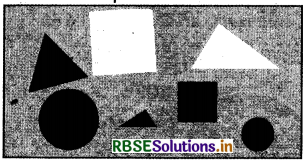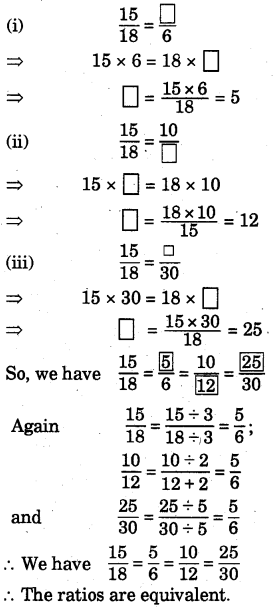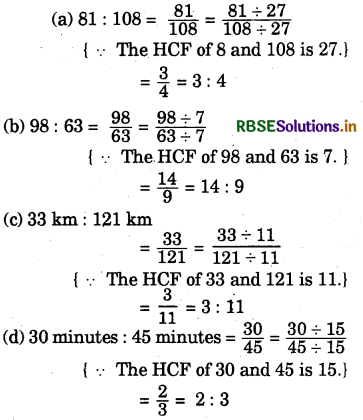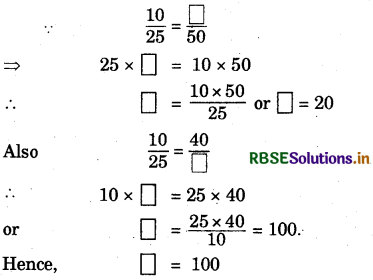RBSE Solutions for Class 6 Maths Chapter 12 Ratio and Proportion Ex 12.1
Rajasthan Board RBSE Solutions for Class 6 Maths Chapter 12 Ratio and Proportion Ex 12.1 Textbook Exercise Questions and Answers.
Rajasthan Board RBSE Solutions for Class 6 Maths in Hindi Medium & English Medium are part of RBSE Solutions for Class 6. Students can also read RBSE Class 6 Maths Important Questions for exam preparation. Students can also go through RBSE Class 6 Maths Notes to understand and remember the concepts easily. Students are advised to practice अनुपात और समानुपात के प्रश्न class 6 of the textbook questions.
RBSE Class 6 Maths Solutions Chapter 12 Ratio and Proportion Ex 12.1
Question 1.
There are 20 girls and 15 boys in a class.
(a) What is the ratio of number of girls to the number of boys?
(b) What is the ratio of number of girls to the total number of students in the class?
Answer:
Given:
Number of girls in a class = 20
Number of boys in a class = 15
∴ Total number of students in a class = 20 + 15 = 35
(a) Number of girls : Number of boys
20 : 15
= \(\frac{20}{15}=\frac{20 \div 5}{15 \div 5}\)
{ ∴ The HCF of 20 and'15 is 5.}
= \(\frac{4}{3}\) = 4 : 3
(b) Number of girls : Total number of students
20 : 35
= \(\frac{20}{35}=\frac{20 \div 5}{35 \div 5}\)
{∵ HCF of 20 and 35 is 5.}
= \(\frac{4}{7}\) = 4:7

Question 2.
Out of 30 students in a class, 6 like football, 12 like cricket and remaining like tennis. Find the ratio of:
(a) Number of students liking football to number of students liking tennis.
(b) Number of students liking cricket to total number of students.
Answer:
Total students in a class = 30
Number of students who like football = 6
Number of students who like cricket = 12
Number of students like tennis = 30-(6+ 12)
= 30 - 18 = 12 students.
(a) Football: Tennis
6 : 12 = \(\frac{6}{12}=\frac{1}{2}\) = 1 : 2
(b) Cricket: Total students
12 : 30
= \(\frac{12}{30}=\frac{12 \div 6}{30 \div 6}\)
{ ∵ HCF of 12 and 30 is 6.}
= \(\frac{2}{5}\) = 2 : 5
Question 3.
See the figure and find the ratio of:

(a) Number of triangles to the number of circles inside the rectangle.
(b) Number of squares to all the figures inside the rectangle.
(c) Number of circles to all the figures inside the rectangle.
Answer:
Number of triangles = 3
Number of squares = 2
and Number of circles = 2
Total figures = 3 + 2 + 2 = 7
(a) Number of triangles : Number of circles = 3 : 2
(b) Number of squares : Total figures = 2 : 7
(c) Number of circles : All figures = 2 : 7

Question 4.
Distances travelled by Hamid and Akhtar in an hour are 9 km and 12 km. Find the ratio of speed of Hamid to the speed of Akhtar.
Answer:
Distance travelled by Hamid in one hour = 9 km
∴ Speed of Hamid = \(\frac{9}{1}\) = 9 km
Also, distance travelled by Akhtar in 1 hr = 12 km
∴ Speed of Akhtar = \(\frac{1}{12}\) km/hr = 12 km
Now, speed of Hamid : speed of Akhtar
9 : 12
= \(\frac{9}{12}=\frac{9 \div 3}{12 \div 3}\)
{ ∵ HCF of 9 and 12 is 3.]
= \(\frac{3}{4}\) = 3:4
Question 5.
Fill in the following blanks :

[Are these equivalent ratios?]
Answer:
By cross-multiplication, we have


Question 6.
Find the ratio of the following :
(a) 81 to 108
(b) 98 to 63
(c) 33 km to 121 km
(d) 30 minutes to 45 minutes
Answer:

Question 7.
Find the ratio of the following :
(a) 30 minutes to 1.5 hours
(b) 40 cm to 1.5 m
(c) 55 paise to ₹ 1
(d) 500 ml. to 2 litres
Answer:
(a) 30 minutes to 1.5 hr
Since 1 : 5 hr = 1.5 × 60 minutes
= 90 minutes
So, 30 minutes : 1.5 hours
= 30 minutes: 90 minutes
= 30 : 90 = \(\frac{30}{90}=\frac{1}{3}\) = 1 : 3
(b) 40 cm to 1.5 m
∵ 1.5 m = ( 1.5 × 100) cm = 150 cm
So, 40 cm : 1.5 m = 40 cm : 150 cm = 40: 150
= \(\frac{40}{150}=\frac{4}{15}\) = 4 : 15

(c) 55 paise to ₹ 1
∵ ₹ 1 = (1 × 100) paise
= 100 paise
So, 55 paise: ₹ 1 = 55 : 100
= \(\frac{55}{100}=\frac{55 \div 5}{100 \div 5}\)
{ ∵ HCF of 55 and 100 is 5.}
= \(\frac{11}{20}\) = 11 : 20
(d) 500 mL to 2 litres
∵ 2 litres = (2 × 1000) mL = 2000 mL
So, 500 mL : 2 litres
= 500 mL : 2000 mL
= \(\frac{500}{2000}=\frac{1}{4}\) = 1 : 4
Question 8.
In a year, Seema earns ₹ 1,50,000 and saves ₹ 50,000. Find the ratio of:
(a) Money that Seema earns to the money she saves.
(b) Money that she saves to the money she spends.
Answer:
Earnings of Seema = ₹ 1,50,000
Savings of Seema = ₹ 50,000
(a) Seema’s earnings : Seema’s savings 1,50,000 : 50,000
= \(\frac{1,50,000}{50,000}=\frac{15}{5}=\frac{15 \div 5}{5 \div 5}\)
{∵ HCF of 15 and 5 is 5.}
= \(\frac{3}{1}\) = 3 : 1
(b) Money spent by Seema
= ₹ (1,50,000 -50,000)
= ₹ 1,00,000
Now, Ratio of money she saves to the money she spends
= \(\frac{50,000}{1,00,000}=\frac{5}{10}=\frac{5 \div 5}{10 \div 5}\)
{ ∵ HCF of 5 and 10 is 5.}
= \(\frac{1}{2}\) = 1

Question 9.
There are 102 teachers in a school of 3300 students. Find the ratio of the number of teachers to the number of students.
Answer:
Number of teachers in a school = 102
Number of students in a school = 3300
Now,
Number of teachers : number of students
102:3300
= \(\frac{102}{3300}=\frac{102 \div 6}{3300 \div 6}\)
{ ∵ HCF of 102 and 3300 is 6.}
= \(\frac{17}{550}\) = 17 : 550
Question 10.
In a college, out of4320 students, 2300 are girls. Find the ratio of:
(a) Number of girls to the total number of students.
(b) Number of boys to the number of girls.
(c) Number of boys to the total number of students.
Answer:
Total number of students in the college = 4320
Number of girls = 2300
∴ Number of boys = 4320 - 2300= 2020
(a) Number of girls: Total number of students
2300 : 4320
= \(\frac{2300}{4320}=\frac{2300 \div 20}{4320 \div 20}\)
{ ∵ HCF of 2300 and 4320 is 20.)
= \(\frac{115}{216}\) = 115 : 216

(b) Number of boys : Number of girls
2020 : 2300
= \(\frac{2020}{2300}=\frac{2020 \div 20}{2300 \div 20}\)
{ ∵ HCF of 2020 and 2300 is 20.1}
= \(\frac{101}{115}\) = 101 : 115
(c) Number of boys : Total students
2020 : 4320
= \(\frac{2020}{4320}=\frac{2020 \div 20}{4320 \div 20}\)
{∵ HCF 2020 and 4320 is 20.}
= \(\frac{101}{216}\) = 101 : 216
Question 11.
Out of 1800 students in a school, 750 opted basketball, 800 opted cricket and remaining opted table tennis. If a student can opt only one game, find the ratio of:
(a) Number of students who opted basketball to the number of students who opted table tennis.
(b) Number of students who opted cricket to the number of students opting basketball.
(c) Number of students who opted basketball to the total number of students.
Answer:
Total students in a school = 1800
Number of students opted basketball = 750
Number of students opted cricket = 800
So, Number of students opted table tennis = 1800 - ( 750 + 800 )
= 1800 - 1550 = 250
(a) Basketball : Table tennis
750 : 250
= \(\frac{750}{250}=\frac{75}{25}=\frac{75 \div 25}{25 \div 25}\)
{∵ HCF of 75 and 25 is 25.)
= \(\frac{3}{1}\) = 3:1

(b) Cricket : Basketball
800 : 750
= \(\frac{800}{750}=\frac{80}{75}=\frac{80 \div 5}{75 \div 5}\)
{ ∵ HCF of 80 and 75 is 5.}
= \(\frac{16}{15}\) = 16 : 15
(c) Basketball : Total students
750 : 1800
= \(\frac{750}{1800}=\frac{75}{180}=\frac{75 \div 15}{180 \div 15}\)
{ ∵ HCF of 75 and 180 is 15.}
= \(\frac{5}{12}\) = 5 : 12
Question 12.
Cost of a dozen pens is ₹ 180 and cost of 8 ball pens is ₹ 56. Find the ratio of the cost of a pen to the cost of a ball pen.
Answer:
1 dozen = 12 pens
∵ Cost of 1 dozen (12 pens) is ₹ 180
∴ Cost of 1 pen = ₹ \(\frac{180}{12}\) = ₹ 15
Also
∵ Cost of 8 ball pens = ₹ 56
∴ Cost of 1 ball pen = ₹ \(\frac{56}{8}\) = ₹ 7
Thus, cost of pen: cost of ball pen 15 : 7

Question 13.
Consider the statement : Ratio of breadth and length of a hall is 2:5. Complete the following table that shows some possible breadths and lengths of the hall.

Answer:

Question 14.
Divide 20 pens between Sheela and Sangeeta in the ratio of 3 : 2.
Answer:
Total pens = 20
Given ratio = 3 : 2
Sum of ratios = 3 + 2 = 5
So, number of pens Sheela got
= \(\frac{3}{5}\) × 20 = 3 × 4 = 12 pens and number of pens Sangeeta got
= \(\frac{2}{5}\) × 20 = 2 × 4 = 8 pens

Question 15.
Mother wants to divide ₹ 36 between her daughters Shreya and Bhoomika in the ratio of their ages. If age of Shreya is 15 years and age of Bhoomika is 12 years, find how much Shreya and Bhoomika will get?
Answer:
Total money = ₹ 36
Ratio the ages of Shreya and Bhoomika
= \(\frac{15}{12}=\frac{15 \div 3}{12 \div 3}\)
{ ∵ HCF of 15 and 12 is 3.}
= \(\frac{5}{4}\) = 5 : 4
Sum of ratio = 5 + 4 = 9
Now, Shreya's share = \(\frac{5}{4}\) × 36 = 5 × 4 = ₹ 20
Bhoomika's share = \(\frac{4}{9}\) × 36 = 4× 4 = ₹ 16
Question 16.
Present age of father is 42 years and that of his son is 14 years. Find the ratio of:
(a) Present age of father to the present age of son.
(b) Age of the father to the age of son, when son was 12 years old.
(c)Age of father after 10 years to the age of son after 10 years.
(d) Age of father to the age of son when father was 30 years old.
Answer:
Present age of father = 42 years.
Present age of son = 14 years.
(a) Present age of father: Present age of son
42 : 14
= \(\frac{42}{14}=\frac{42 \div 14}{14 \div 14}\)
{ ∵ HCF of 42 and 14 is 14.}
= \(\frac{3}{1}\) = 3 : 1
(b) ∵ 2 years before son was 12 yrs old,
So father’s age 2 years before
= (42 - 2) = 40 years
∴ \(\frac{\text { Father's age }}{\text { Son's age }}=\frac{40}{12}=\frac{40 \div 4}{12 \div 4}\)
{ ∵ HCF of 40 and 12 is 4. }
= \(\frac{10}{3}\) = 10 : 3

(c) Age of father after 10 years = 42 + 10 = 52 years
Age of son after 10 years = 14 + 10 = 24 years
Age of father : Age of son = 52: 24
= \(\frac{52}{24}=\frac{52 \div 4}{24 \div 4}\)
{ ∵ HCF is 52 and 24 is 4.}
= \(\frac{13}{6}\) = 13:6
(d) When father was 30 years old, i.e. (42 - 30) = 12 years ago.
Son’s age 12 years ago = 14 - 12 = 2 years
Age of father: Age of son = 30 : 2
= \(\frac{30}{2}=\frac{30 \div 2}{2 \div 2}\)
{∵ HCF of 12 and 2 is 2.}
= \(\frac{15}{1}\) = 15 : 1

- RBSE Solutions for Class 6 Maths Chapter 2 Whole Numbers InText Questions
- RBSE Class 6 Maths Important Questions Chapter 1 अपनी संख्याओं की जानकारी
- RBSE Solutions for Class 6 Maths Chapter 7 भिन्न Intext Questions
- RBSE Solutions for Class 6 Maths Chapter 7 Fractions Ex 7.4
- RBSE Solutions for Class 6 Maths Chapter 1 Knowing our Numbers Ex 1.1
- RBSE Solutions for Class 6 Maths Chapter 1 Knowing our Numbers InText Questions
- RBSE Solutions for Class 6 Maths in Hindi Medium & English Medium
- RBSE Solutions for Class 6 Maths Chapter 7 Fractions InText Questions
- RBSE Solutions for Class 6 Maths Chapter 7 Fractions Ex 7.6
- RBSE Solutions for Class 6 Maths Chapter 7 Fractions Ex 7.5
- RBSE Solutions for Class 6 Maths Chapter 7 Fractions Ex 7.3